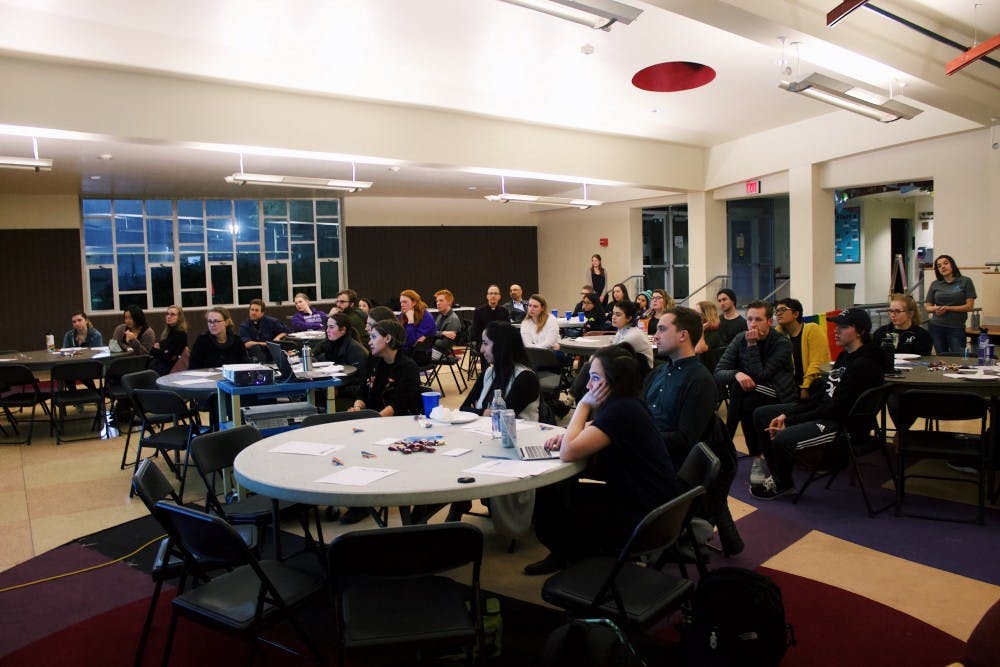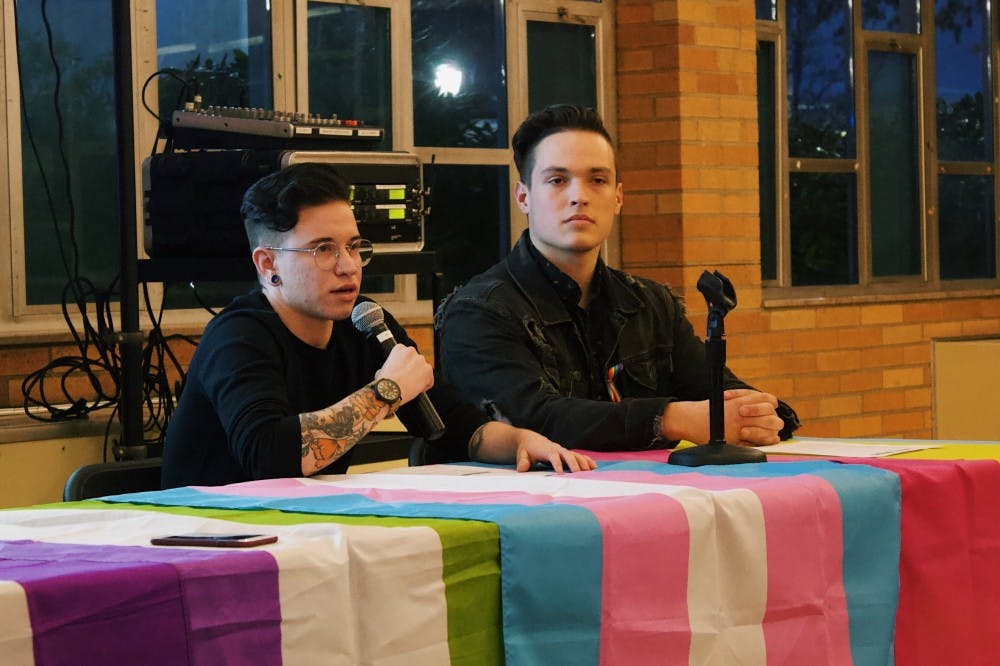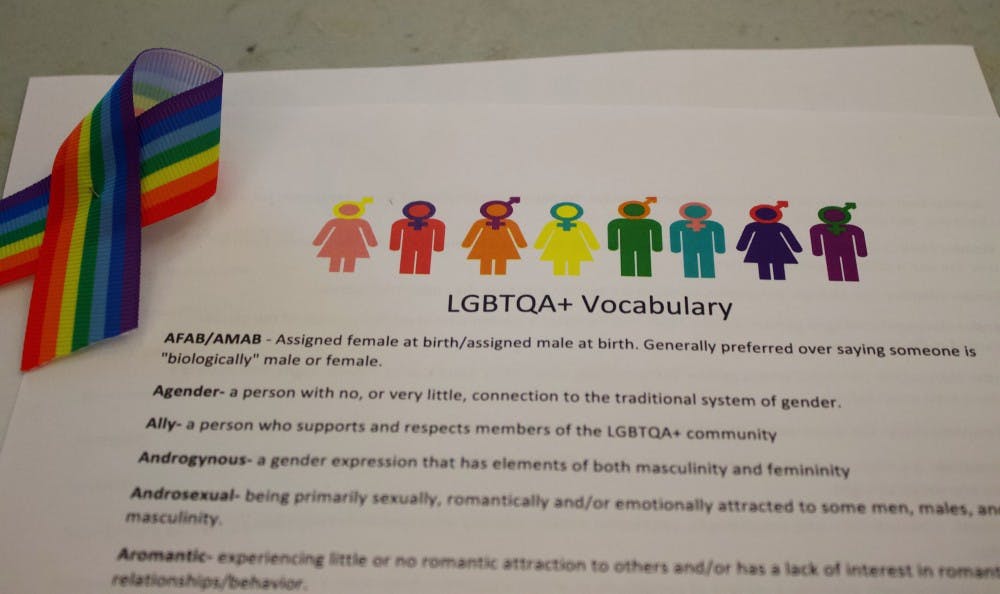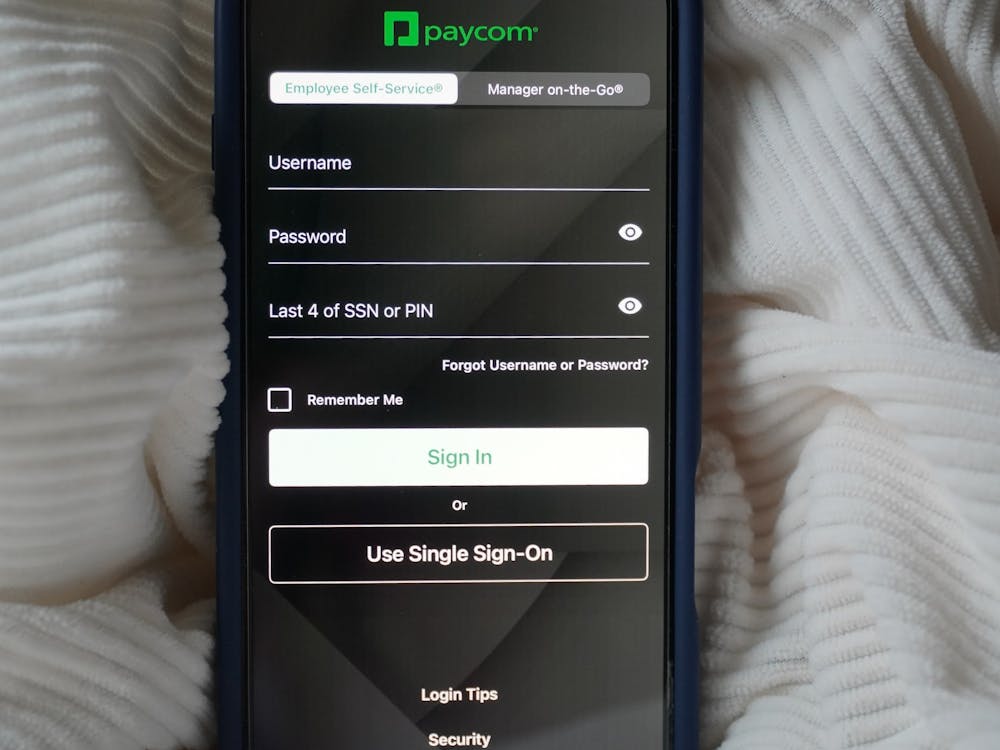“Asexual.” “Bigender.” “Cisnormativity.” “Gender Non-Conforming.” These are terms listed on an icebreaker sheet that was handed out to everyone at the panel “Improving LGBTQIA Lives on Campus,” hosted by the Gay-Straight Partnership on Tuesday evening as part of Diversity Dialogues.
The panel featured students Acacia Welsford, Keaton Gaughan, Megan MacInnes, Harrison Kasper and Joselene Piedra Rodriguez and was moderated by Aitana Shough. The discussion focused on four areas: integration of more queer-inclusive language on campus, how to properly treat LGBT+ people with respect (or “etiquette”), gender-neutral bathrooms and inclusivity in the classroom. The panelists also answered anonymous questions from the audience.
Etiquette: Treating LGBT+ people with respect
Panelists shared personal experiences of how they relate their identities on campus.
“I had a summer job with Physical Plant, and there were jokes that were made (among coworkers) that made me feel like I had to go back into the closet,” said Welsford, a junior history major. "I think there’d be huge potential in having someone from TransActive and GSP come in. I think 99.9% of people want to be inclusive but just don’t know.”
The panelists also mentioned their similar experiences of the repetitive nature of coming out to multiple people throughout their lives.
“Coming out is not a single experience” said MacInnes, who is president of the Gay-Straight Partnership. “It is something that we have to do again and again and again.”
One way they believe that etiquette for LGBT+ people could improve on campus is GSP’s collaboration with the director of Equity and Inclusion.
“Director of Equity and Inclusion has not been hired yet, but we would love for GSP to be in direct connection with that person,” MacInnes said.
Gaughan recommended that students who are having issues with a professor’s non-inclusive language to speak with the Diversity and Inclusion Program coordinator, Yuri Hernández Osorio.

Gender Neutral Language
Another struggle that LGBT+ people face every day is the non-inclusive language used by their peers. Panelists say many nonbinary and trans individuals go through their days being constantly misgendered, and say that the fix for this is to simply be cognizant of what you are saying.
Sometimes it is as simple as addressing a group as “distinguished guests,” rather than as “ladies and gentlemen.”
Another way to remedy this is to never assume another person’s gender.
“It would be really cool if every time you met a new person, you could ask, ‘Hey, what’s your name and what are your pronouns?’” Macinnes said.
Pronouns are essential, but many gender non-conforming people are understanding if you accidentally make a mistake.
“If you mess up someone’s pronouns, it’s OK,” Gaughan said. “Just correct yourself, apologize quickly and move on. And if you don’t know, just ask. It’s not scary. Just ask.”
The panelists also stressed the fluidity of both gender identity and sexuality, and said to remember that discovering who you are is a process. Welsford recommends doing check-ins about your friends’ pronouns and identity.
Inclusivity In Classrooms
Panelists said the lack of inclusivity is also evident in the classroom. One obstacle that LGBT+ people often face is having professors use their correct names and pronouns. Though many UP professors have implemented a practice of asking students’ preferred names and pronouns on the first day of class, it is still not practiced as widely as panelists believe it should be.
This gesture goes a long way in terms of making gender non-conforming students feel safe in the classroom, panelists explained. And in terms of feeling safe on campus, Gaughan said that the university still has a long way to go: gender identity has not yet been adopted into UP’s non-discrimination policy.
Sexual orientation was added to the non-discrimination policy in 2013 after much controversy and a student movement called “Redefine Purple Pride.” But Gaughan says this is not enough. And those who think gender identity is under the umbrella of sexual orientation are mistaken.
“It’s conflated with sexuality,” Gaughan said. “They’re two entirely different concepts.”
The panelists also encourage professors to integrate queer examples into their teaching, such as mentioning historical and modern figures who are queer and using gender-neutral pronouns in those scenarios.
“It’s important to have gender-neutral pronouns even when not specifically talking about queer issues,” MacInnes said.

Gender Neutral Bathrooms
Though the recent addition of two gender-neutral bathrooms in Buckley Center bring the campus-wide count up to five, finding a bathroom that they feel safe using is a daily concern for gender non-conforming students. Panelists highlighted that there are over 20 buildings on campus with over 80 bathrooms, but there are only gender-neutral bathrooms in three, excluding residence halls Kenna Hall and Lund Family Hall.
“Our ideal goal is that every single building have a gender-neutral bathroom,” MacInnes said. “The newer buildings are often with them, so it’s the older ones we’re going to be focused on.”
Gaughan feels that the needs of LGBT+ students are still not being properly met.
“It sucks to not be able to pee,” Gaughan said. “That’s the bottom line. I just don’t feel safe, and I really do value those times when I feel safe.”

The panelists finished the event with an anonymous question and answer session:
Q: If you think a friend or close friend is not straight, do you think there is an appropriate way to ask?
“Know that not everyone can come out,” MacInnes said. “If you wanted to ask, it’d be best to be done in private. If you wanted to test the waters, there's queer celebrities and tv shows. Make it known that you already their supporter even if you don't come out to them.”
Q: Is “butch” a negative term?
“Terms are terms, but everyone has different interpretations to them,” Welsford said. “The word butch is something I personally don’t use.”
Q: Is it offensive to ask a transgender person about their life before they transition?
“If you want this question answered, you need to make a safe space for them,” Gaughan said. “You don't want to ever tokenize any trans person just because they're the only trans person you know.”
Q: What can student allies be doing more?
“My biggest problem is that you need to listen more,” Kasper said. “I don't feel personally comfortable being gay around my male friends. The way they consistently talk about girls, I don’t necessarily feel comfortable talking about my romantic life.”
The Gay-Straight Partnership meets weekly on Tuesdays from 6 p.m. to 7 p.m. in Franz 115.








